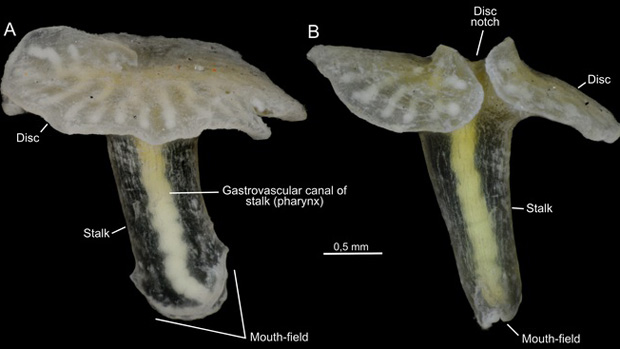New deep-sea 'mushrooms' puzzle for scientists
Discovery of unusual new species could mean scientists have to completely 'reshape the tree of life'

A free daily email with the biggest news stories of the day – and the best features from TheWeek.com
You are now subscribed
Your newsletter sign-up was successful
Scientists say that two strange deep-sea animals discovered in off the coast of Tasmania almost three decades ago could change our understanding of evolution.
The soft-bodied creatures, which have finally been named Dendrogramma enigmatica and Dendrogramma discoides, do not fit into any known categories in the animal kingdom.
Leonid Moroz, a neurobiologist at the University of Florida says they could turn out to be the descendents of early animals. If they did it would "completely reshape the tree of life, and even our understanding of how animals evolved, how neurosystems evolved, how different tissues evolved," he says. "It can rewrite whole textbooks in zoology."
The Week
Escape your echo chamber. Get the facts behind the news, plus analysis from multiple perspectives.

Sign up for The Week's Free Newsletters
From our morning news briefing to a weekly Good News Newsletter, get the best of The Week delivered directly to your inbox.
From our morning news briefing to a weekly Good News Newsletter, get the best of The Week delivered directly to your inbox.
The translucent mushroom-shaped organisms are only a few centimetres long with a mouth at the bottom of the 'stalk', which leads to a digestive canal. Unusually, they are not symmetrical.
The animals' lifestyle "is as mysterious as their appearance", according to the National Geographic, as it does not appear to be able to swim.
"Finding something like this is extremely rare," Jorgen Olesen, co-author of the paper on the new species, told the BBC. "It's maybe only happened about four times in the last 100 years. We think it belongs in the animal kingdom somewhere; the question is where."
Scientists discovered that the new 'mushrooms' shares similarities with the Cnidaria, the animal group that includes jellyfish and coral polyps, but they failed to meet all of the criteria required to be in the group.
A free daily email with the biggest news stories of the day – and the best features from TheWeek.com
Genetic material could be analysed to provide more answers, but the animal's DNA has been lost in the 30 years since they were found 30 years ago, when scientists failed to recognise their significance. New specimens will need to be found.
"We published this paper in part as a cry for help," said Olesen."There might be somebody out there who can help."